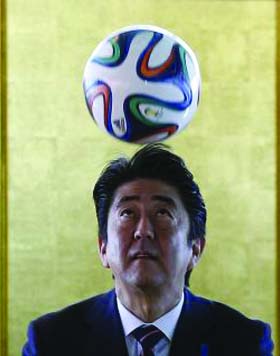
Reuters :
Japan’s Prime Minister Shinzo Abe touted the success of his economic policies on a visit to Brazil on Friday and said it was time for the two nations to expand their trade and investment partnership.
On the first visit to Brazil in a decade by a Japanese prime minister, Japanese banks extended $700 million in loans to boost Brazilian soy and corn exports to Japan and help finance oil platform construction for Brazil’s growing offshore oil industry.
Abe told Brazilian business leaders that Japan has closed a 15-year deflation cycle since his stimulus policies began to kick in and there is great potential to expand trade and investment with Latin America’s biggest economy.
“With Japan growing again, we can grow with other nations,” he said in comments to executives translated by an interpreter.
“Japanese companies are eyeing Brazil with great expectations,” he said later at a deal-signing meeting with President Dilma Rousseff.
Brazil’s state-run oil company Petroleo Brasileiro SA signed up for a $500 million loan from Mizuho Bank Ltd to build eight hulls that will be converted into floating oil platforms for deep-water oil production.
Sumitomo Mitsui Banking Corp (SMBC), the main banking unit of Tokyo-based Sumitomo Mitsui Financial Group, agreed to loan Brazilian agribusiness company Amaggi $200 million for soy and corn projects that will improve shipments to Japan.
Brazil’s state development bank BNDES agreed to join forces with Japan’s bank for international cooperation, JBIC, to look for areas to promote investment by small and medium-sized Japanese companies in Brazil.
Besides shipbuilding, Japanese companies are interested in investing in the infrastructure Brazil needs to continue growing, Brazilian and Japanese officials said. A plan to build a high-speed train between Brazil’s two largest cities, Sao Paulo and Rio de Janeiro, is particularly promising, they said.
Japan is Brazil’s sixth largest trading partner, with two-way trade of $15.7 billion in 2012. Brazilian agribusiness is the second-largest supplier of corn and soybeans to Japan.
Japan’s enthusiasm for Abe’s economic stimulus policies has waned this year after the country’s growth sagged and investors grew impatient for more drastic structural reforms.
Rousseff thanked Japan for opening its market to Brazilian pork last year, but she asked for the lifting of a ban on Brazilian beef that Japan and a few other countries still have in place due to a mad cow scare.
Brazil’s Vale SA, the world’s largest iron ore miner, inked an agreement with Japan Oil, Gas and Metals Corp (JOGMEC) to strengthen cooperation in coal mining in Mozambique. Vale also renewed ties with JBIC for financing iron ore, coal and other mining projects.
It wasn’t all business for Abe. The Japanese leader met Brazilian soccer stars who have played in Japan and thanked them for helping develop the sport in his country.
Among them was Zico and Dunga, Brazil’s newly-appointed coach who played in Japan for three years and was Japan’s coach for another three. Zico gave Abe a soccer ball signed by players. Abe kicked a pass to Zico and headed the ball with joy.

